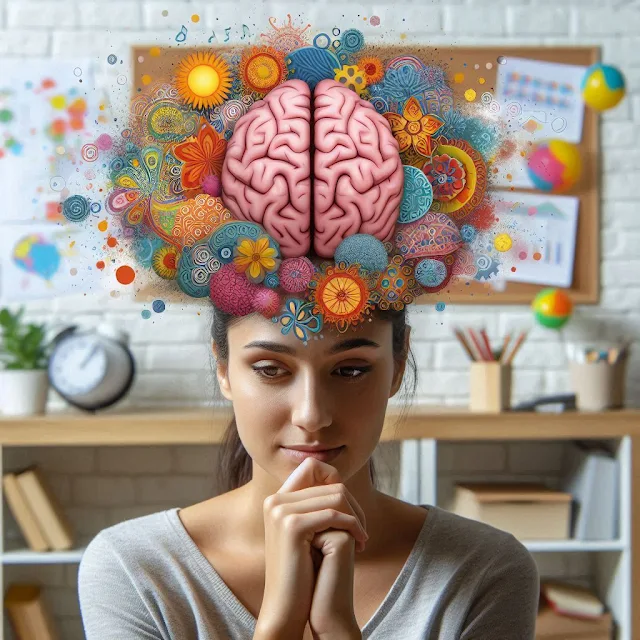- Get link
- X
- Other Apps
- Get link
- X
- Other Apps
1. Understanding Mental Health: Why It Matters
Mental health isn't just about avoiding illness.
It's about feeling balanced, resilient, and alive.
Every day, millions face stress, anxiety, or sadness —
and that’s perfectly normal sometimes.
But when those feelings last too long or grow intense,
it can affect your life deeply — work, relationships, even sleep.
That’s why mental health awareness has become so crucial in 2025.
Experts at the World Health Organization say
“Good mental health is a foundation for well-being.”
That hit home for me —
we all need to care for our minds as much as bodies.
2. Common Mental Health Issues Today
Anxiety Disorders
These affect about 1 in 5 people globally.
Symptoms include excessive worry, restlessness,
and sometimes physical problems like rapid heartbeat.
Anxiety is treatable, but it can sneak in subtly,
so early recognition matters.
Depression
More than 280 million people worldwide
suffer from depression, says WHO.
It’s not just feeling sad —
it’s a deep sense of hopelessness, loss of interest, fatigue.
If untreated, depression can severely impact daily functioning.
Stress and Burnout
Especially common in our fast-paced, digital world.
Chronic stress affects both body and mind —
leading to fatigue, irritability, and lowered immunity.
3. Key Factors Influencing Mental Health
Genetics and Brain Chemistry
Some mental health conditions have genetic roots.
But genes aren’t destiny — environment plays a huge role too.
Lifestyle Habits
Sleep, diet, exercise —
they shape how our brains cope with stress.
Lack of sleep, poor nutrition,
or inactivity worsens mental health.
Social Connections
Humans are wired for connection.
Isolation or poor relationships can
deepen mental health struggles.
Life Events
Trauma, loss, or major changes can trigger mental health issues.
Understanding this helps us be
more compassionate toward ourselves and others.
4. Proven Strategies to Improve Mental Health
Regular Exercise
Exercise boosts endorphins, the brain’s “feel-good” chemicals.
Even a 30-minute daily walk can reduce anxiety and lift mood.
A 2024 study from Harvard showed people who
exercised regularly had 25% less depression.
Mindfulness and Meditation
These practices help focus your attention and calm your mind.
They lower cortisol — the stress hormone —
and improve emotional regulation.
Balanced Nutrition
Foods rich in omega-3s, antioxidants,
and vitamins support brain health.
Avoiding excessive caffeine and sugar helps
stabilize mood swings.
Sleep Hygiene
Poor sleep worsens mental health symptoms drastically.
Set a routine, avoid screens before bed,
and keep your bedroom cool and dark.
Seeking Professional Help
Sometimes, self-care isn’t enough.
Therapists, counselors, and psychiatrists
provide tailored support.
Medications may be recommended for some conditions,
always under guidance.
5. Mental Health in the Digital Age: Challenges and Solutions
The internet offers support but also risks.
Social media can cause comparison, anxiety,
and sleep disruption.
However, many mental health apps and
online therapy services now provide accessible care.
Balance is key
Limit screen time, engage in offline hobbies,
and foster face-to-face connections.
6. Building a Mental Health Routine: A Simple Checklist
-
Get 7–9 hours of quality sleep nightly.
-
Move your body daily — walk, stretch, dance.
-
Practice mindfulness or deep breathing for 5–10 minutes.
-
Eat brain-friendly foods like nuts, fish, and colorful veggies.
-
Stay connected with loved ones regularly.
-
Don’t hesitate to seek professional help if overwhelmed.
7. When to Get Help | Recognizing Warning Signs
If you notice persistent feelings of hopelessness,
changes in appetite, sleep, or thoughts of self-harm —
please reach out to a healthcare provider immediately.
Early intervention can change outcomes significantly.
Remember, asking for help is a sign of strength,
never weakness.
Mental health is a journey, not a destination.
Taking small steps daily builds resilience over time.
Let’s be kind to ourselves and others.
What’s one small habit you can try today
to boost your mental well-being?
References
-
World Health Organization, Mental Health Factsheet (2023)
-
Harvard T.H. Chan School of Public Health, Exercise & Depression Study (2024)
-
Mayo Clinic, Sleep and Mental Health (2025)
anxiety
depression
digital mental health
exercise benefits
mental health
mental wellness tips
mindfulness
professional help
sleep hygiene
stress management
- Get link
- X
- Other Apps



